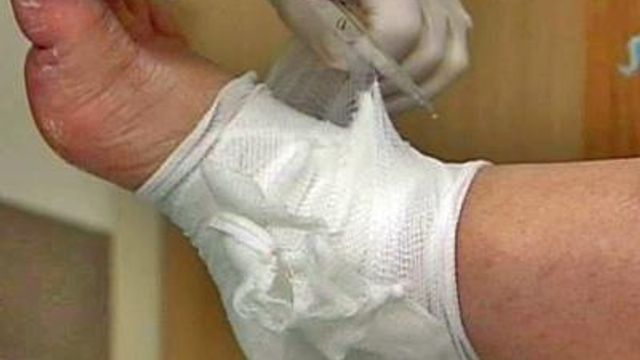UNC researchers work to save limbs
Diabetics can lose their legs from complications arising from the disease. UNC researchers hope a new trial treatment will lead to saving those limbs.
Posted — UpdatedDiabetes can lead to poor blood flow in feet and to nerve damage. Peggy Watson, 61, a diabetes patient, can attest to the dangers those conditions pose.
"I could step on anything really, a rock or anything, and it wouldn't really hurt," Watson said.
Although she didn't feel any pain, those missteps could leave behind dry, cracked skin – and a slow-healing wound.
Dr. Bill Marston, a vascular surgeon at UNC Hospitals, said doctors aim to get diabetics' wounds to heal "rapidly, because as long as there's an open wound, there's a chance of infection, and that's what really leads to limb loss."
Watson comes for hyperbaric-oxygen treatment at UNC's wound-care center. The high-pressure chamber helps improve oxygen flow to her wound and, thus, promotes healing.
"I'd say it's about 75 percent healed from where we started," Marston said.
To help more diabetes patients, Marston has started work on the MATRIX trial, taking place at 25 medical centers nationwide. The trial enrolled patients who have been diagnosed with type 1 or type 2 diabetes, who have non-healing foot ulcers and who have have failed standard care.
The patients get the gel Excellerate applied to their foot wounds. The gel contains a gene to stimulate tissue growth factors.
"They bring the cells in that start to heal. And they cause them to lay down new collagen and things that support healing," Marston said.
The healing process is also stimulated by a good oxygen supply, such as that provided by a hyperbaric chamber. So far, the results of the trial have been promising, Marston said.
Watson said she has learned to watch more closely eye for the first sign of new foot ulcers.
"You really have to take of yourself when you have diabetes, because so many complications can come from it," Watson said.
• Credits
Copyright 2024 by Capitol Broadcasting Company. All rights reserved. This material may not be published, broadcast, rewritten or redistributed.





